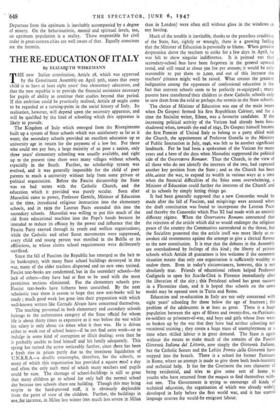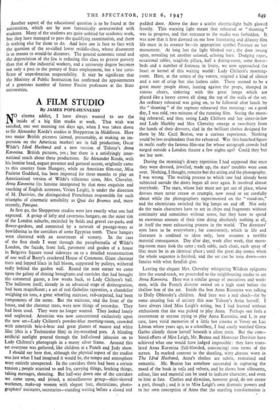THE RE-EDUCATION OF ITALY
By ELIZABFTH WISKENIANN
THE new Italian constitution, Article 28, which was approved by the Constituent Assembly on April 3oth, states that every child is to have at least eight years' free elementary education, and that the new republic is to provide the financial assistance necessary for pupils of ability to continue their studies beyond that period. If this ambition could be practically realised, Article 28 might come to be regarded as a turning-point in the social history of Italy. Its realisation, however, will depend upon the necessary apparatus, and will be qualified by the kind of schooling which this apparatus is likely to provide.
The Kingdom of Italy which emerged from the Risorgimento built up a system of State schools which was satisfactory as far as it went; the secondary schools provided an excellent education up to university age in return for the payment of a low fee. For those who could not pay fees, a large majority of so poor a nation, only three years' elementary schooling was usually available, and right up to the present time there were many villages without schools, especially in the South. Further, no scholarship system was evolved, and it was generally impossible for the child of poor parents to reach a university without help from some private or political organisation. Before the Fascist dictatorship the State was on bad terms with the Catholic Church, and the education which it provided was purely secular. Soon after Mussolini came to power, Professor Gentile, Minister of Education at the time, introduced religious instruction into the elementary schools, and in 1929 the Lateran Pacts extended this into the secondary schools. Mussolini was willing to put this much of the old State educational machine into the Pope's hands because he intended to reduce its efficacy by the power and influence that the Fascist Party exerted through its youth and welfare organisations; While the Catholic and other Scout movements were suppressed, every child and young person was enrolled in the Balilla or its affiliations, to whose claims school requirements were deliberately sacrificed.
Since the fall of Fascism the Republic has emerged as the heir to its bankruptcy, with many State school buildings destroyed in the war, many of the older teachers dispersed and no new ones trained. Fascist text-books are condemned, but in the secondary schools—for lack of others—they have had at first to be used with the most pernicious sections eliminated. For the elementary schools pre- Fascist text-books have hitherto been unearthed. By the next scholastic year there is reason to hope that new text-books will be ready ; mucli good work has gone into their preparation with which well-known writers like Corrado Alvaro have concerned themselves.
The teaching personnel in both elementary and secondary schools belongs to the unfortunate category of the State official for whom life is about thirty times as expensive as it was before the war while his salary is only about six times what it then was. He is driven either to work out of school hours—if he can find extra work—or to indulge in some kind of corruption or illicit dealing; even then he is probably unable to feed himself and his family adequately. This spring has turned the screw noticeably further, since there has been a fresh rise in prices partly due to the imminent liquidation of U.N.R.R.A.—a double catastrophe, therefore, for the schools, to many of which this organisation has provided a square meal a day and often the only such meal of which many teachers and pupils could be sure. The shortage of school-buildings is still so great that many children go to school for only half the normal school day because two schools share one building. Though this may bring respite to the hard-pressed staff, it is obviously deplorable from the point of view of the children. Further, the buildings in u.se, for instance, in Milan last winter (not much less severe in Milan
than in London) were often still without glass in the windows er any heating.
Much of the trouble is inevitable, thanks to the penniless conditien of the State, but, rightly or wrongly, there is a growing feeling that the Minister of Education is personally to blame. When genuine desperation drove the teachers to strike for a few days in April, he was felt to show singular indifference. It is pointed out that secondary-school fees have been forgotten in the general upward trend, and still stand at about 500 lire per annum; it would be only reasonable to put them to 2,000, and out of this increase the teachers' pittance might well be raised. What creates the greatest indignation among the opponents of confessional education is the fact that convent schools seem to be perfectly re-equipped ; many parents have transferred their children to these Catholic schools only to save them from the cold or perhaps the vermin in the State schools.
The choice of Minister of Education was one of the main issues when De Gasperi formed his first Republican Cabinet, and for a time the Socialist writer, Silone, was a favourite candidate. If the increasing political activity of the Vatican had already been fore- shadowed when, towards the end of 1945, De Gasperi himself became the first Premier of United Italy to belong to a party allied with the Church, the appointment of Professor Gonella to the Ministry of Public Instruction in July, 1946, was felt to be another significant landmark. For he had been a spokesman of the Vatican for many years and a hero of the days when Mussolini suppressed the political side of the Osservatore Romano. Thus the Church, in the view of all those who do not identify the interests of the two, had captured another key position from the State ; and as the Church has been able, ,since the war, to expand its wealth in various ways at a time when the financial difficulties of the State seem overwhelming, a Minister of Education could further the interests of the Church and of its schools by simply letting things go.
It had been generally supposed that a new Concordat would be made after the fall of Fascism, and misgivings were aroused when the draft constitution was found to incorporate the Lateran Pacts and thereby the Concordat which Pius XI had made with an entirely different regime. When the Osservatore Romano announced that the rejection of the article which did so would endanger the religious peace of the country the Communists surrendered to the threat, but the Socialists protested that the article itself was more likely to re- awaken old resentments against the attempt to give a Clerical flavour to the new constitution. It is true that the debates in the Assembly are overshadowed by feelings of this kind ; the liberty of private schools which Article 28 guarantees is less welcome if the economic situation means that only one organisation is sufficiently wealthy to endow them. Even in today's circumstances, however, this is net absolutely true. Friends of educational reform helped Professor Codignola to open his Scto/a-Citta in Florence immediately after the liberation of the city ; this Pestalozzi school has great success in a Florentine slum, and it is hoped that schools on the same model may be opened soon in Turin and Rome.
Education and re-education in Italy are not only concerned with eight years' schooling for those below the age of fourteen ; the problem of the adolescents is at least as great. There is a huge population between the ages of fifteen and twenty-five, ex-Partisans, ex-soldiers or prisoners-of-war, and boys and girls whose lives were so broken up by the war that they have had neither schooling nor vocational training ; they create a huge mass of unemployment at a time when skilled labour is in great demand. The State is again without the means to make much of the remains of the Fascist Giovenni Italiana del Litton°, now simply the GioventU but the Catholic Scouts and the Leftist Fronte dwlla Gioventit have stepped into the breach. There is a school for former Partisans in Rome, where an attempt is made to give them both book-learning and technical help. It has for the Continent the rare character of being residential, and tries to give some sort of home to youths who have returned from the moguls to find themselves with- out one. The Government is trying to encourage all kinds of technical education, the organisation of which was already widely developed in Italy before the first world war, and it has started language courses for would-be emigrant labour.
Another aspect of the educational question is to be found at the universities, which are by now fantastically overcrowded with students. Many of the students are quite unfitted for academic work, but they have managed to pass the qualifying examination, and there is nothing else for them to do. And here one is face to face with the question of the so-called lower middle-class, whose discontent is as manna to would-be dictators. The general economic trend and the depreciation of the lira is reducing this class to greater poverty than that of the industrial workers, and a university degree becomes not only a pass to the penury of State employment, but a last certi- ficate of unproletarian respectability. It may be significant that the Ministry of Public Instruction has confirmed the appointments of a generous number of former Fascist professors at the State universities.



































 Previous page
Previous page